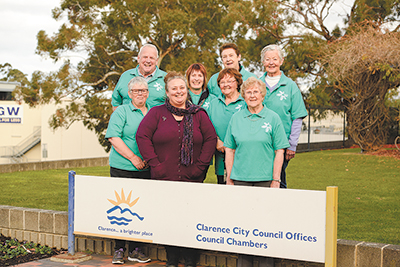Located in southeast Tasmania just above Hobart, Clarence City Council has the second largest population of any municipality in the State.
It also has a large aging population – it is estimated that by 2020 more than 25 per cent of residents will be aged 65+ years.
Since 2007, Council has run a dedicated committee to ensure older residents continue to feel at home in Clarence.
The Clarence Positive Ageing Advisory Committee (CPAAC) is made up of 12 residents hailing from various locations across the municipality and a number of key service providers.
Clarence Mayor Doug Chipman nominated the committee as Local Government Focus High Achievers for the work it has done to establish the Council as a leader in the area.
In 2014, Clarence became the first Tasmanian council to be recognised by the World Health Organisation (WHO) Global Network of Age Friendly Cities and Communities.
Meetings are conducted four times a year in February, May, August and November; Alderman Sharyn von Bertouch chairs the committee and Alderman James Walker is Proxy Chair.
Over the past decade the committee has helped usher in a large number of projects to benefit older people.
A range of health and lifestyle activities is offered to older residents; community gardens and cooking programs have been established in partnership with schools; there are multiple men’s sheds across the municipality; and a community bus operates across three suburbs.
In 2016, Council took home a Local Government Association Tasmania (LGAT) award for excellence for the ‘aWake Before Death’ project, which brought together a range of partners and community members to host a series of workshops and produce a short film about end of life care.
Community Planning and Development Officer, Julie Andersson, said challenging stereotypes about older people has been a crucial role for the committee.
“A major challenge has been to create new ways of thinking that are linked to ‘Age Friendly’ approaches.
“This approach combats ageism and is linked with the determinants and diversity of ageing.
“That is, we are not all ageing the same – there is no ‘typical’ older person and we are all ageing – and that shouldn’t be a ‘negative’.
“This is why programs such as Our Shared Space at council are critical to show that work in this space is not just for older people – but for people in the early and middle years as well – especially given population ageing and Council’s demographic.”
The Our Shared Space program works with Council’s youth services to foster intergenerational connections in the community.
Ms Andersson said building trust and collaborative relationships has been an important part of the process.
“Council has established itself as a worldwide leader in this space – its work with residents and services to create policies, programs and practices, which are grounded in a solid foundation of community governance, means that trust and great relationships have been built up over the past 10 years that has made it easier to enter into partnerships and see new programs established that add so much value to the community and beyond.”
Ms Andersson said CPAAC is currently undertaking a review of Council’s 2nd Positive Ageing Plan in preparation for its 3rd plan from 2018 –2022.
“We are partnering with Dr Peta Cook, Academic and Artist from the University of Tasmania to undertake consultations based on her previous research and photographic exhibition ‘Reclaiming the Self: How older people perceive and experience their ageing’.
“The community will be invited to view parts of the exhibition at locations across the city during July and August and provide their input to a series of four questions designed to stimulate thought about what age friendly means to them and where they see themselves in the future.”
In October this year, Clarence will host the 2nd annual Australian Age Friendly City and Community Network Forum for member councils across Australia.








